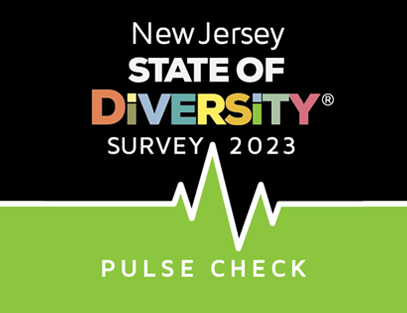
Diversity in the workplace: Taft Communications Rutgers-Eagleton Poll reveals deep divide in attitudes in the midst of political culture wars
New Jersey Republicans and Democrats at odds regarding importance of diversity in the workplace
Higher rates of workplace DEI training experienced by higher income and higher education workers
TRENTON, NJ (August 22, 2023) – Nationwide, headlines have touted an apparent growing chasm between those who see and don’t see value in diversity, equity, and inclusion (DEI) in the workplace. A recent pulse survey conducted by Rutgers Eagleton Center for Public Polling (ECPIP), as part of the multi-year Taft Communications State of Diversity® survey, sheds light on the prevailing sentiments of employed adults in New Jersey regarding DEI in the workplace. With daily discussions about “woke” culture and critical race theory, these newest results reveal notable differences based on political affiliation and race, among others.
A striking divergence, particularly concerning political affiliation, emerged when survey respondents were asked about the significance of workplace diversity, defined as representation of genders, races, ethnicities, religions, sexual orientations, ages, and abilities, when it comes to their fellow employees. Overall, 42% of employed New Jersey adults considered diversity among their peers “essential,” 29% said it was “important but not essential,” and 28% said “not essential.” While 64% of employed Democrats regarded it as “essential,” only 42% of employed independents and a mere 17% of employed Republicans echoed this sentiment; 52% of Republicans say it is “not important,” compared to 9% of Democrats.
Click to tweet: New Jersey Republicans and Democrats are at odds regarding the importance of #diversity in the workplace, according to results of a new State of Diversity® survey from @taftcomms and @EagletonPoll. http://taftcomms.com/ioC050PAV3s
“We’ve conducted our New Jersey State of Diversity survey regularly since 2015,” said Sheila Cort, vice president and head of the DEI communications practice at Taft Communications. “We added this pulse survey amid the recent nationwide conversation around DEI and the actions several states have made that impact diversity and inclusion in the workplace and schools, to see if, and how, New Jersey workplaces are also changing. Our pulse survey reveals movement that show shifts in attitude that may run counter to efforts within our state to create a more diverse, equitable, and inclusive environment where all have a sense of belonging.”
The survey also revealed similar outcomes when the same question about representation was asked about managers and company leaders in the workplace. Forty-three percent saw diversity among managers and company leaders as “essential,” while 27% said “important but not essential” and another 27% said “not important.” A closer look uncovers a significant difference based on political affiliation, with 68% of working Democrats seeing diversity in the workplace as “essential,” versus 20% of Republicans. The same question also revealed differences across race, with more than twice as many Black respondents (73%) saying it was “essential” versus white respondents (31%).
“It is concerning that, when it comes to sentiments about the importance of diversity in the workplace, there is such a large divide based on race and political affiliation,” Cort said.
When asked whether the focus on diversity, equity, and inclusion in the workplace in 2023 is more important, just as important, or less important than it was three years ago in 2020, 44% of working New Jersey adults believed it was “just as important,” with 32% seeing it as “more important,” and 19% saying “less important.” Here too, several notable differences emerged across race and political lines. Democrats (43 percent) were more likely to believe it is now “more important” compared to Independents (30 percent) and Republicans (20 percent). Women (38 percent) displayed a stronger inclination than men (25 percent) to view it as “more important.” And 25% of white respondents said it is “more important” now, whereas 53% of Black respondents said the same.
“Like almost everything else, diversity, equity, and inclusion in the workplace has become a highly partisan and polarizing issue,” said Ashley Koning, an assistant research professor and director of the Eagleton Center for Public Interest Polling (ECPIP) at Rutgers University–New Brunswick. “A quarter of men, white residents, and older residents, one in five independents, and over one-third of Republicans all say diversity, equity, and inclusions have actually become less important in the past three years. These same groups are typically more conservative, in general and less supportive of ‘woke’ and ‘woke’-adjacent initiatives.”
The survey also sought to uncover whether New Jersey workers were participating in DEI training and education in the workplace in the past 12 months — 62% said “yes” and 38% said “no.” More Democrats (68%) than Republicans (55%) participated in this type of training or learning experience, while more women (67%) than men (57%) did the same. Income and education levels also emerged as notable factors as individuals with higher incomes and higher levels of education were more likely to have participated in workplace DEI training during the past year. Specifically, 77% of those earning $150,000 or more reported participation, compared to 50% of individuals earning less than $75,000. Similarly, 75% of respondents with a college education or higher participated versus 50% of those with some college education or less.
“While a majority of New Jersey employees report taking part in DEI training, stark differences by key socioeconomic factors indicate more variable experiences and less access among those with lower incomes and educational levels,” said Jessica Roman, a research associate at ECPIP.
Methodology
This survey was conducted by Eagleton Center for Public Interest Polling (ECPIP) at the Eagleton Institute of Politics at Rutgers, the State University of New Jersey. A random sample of 1,002 New Jersey adults (18+) were contacted via landline and cellular telephone between April 27 to May 5, 2023. Survey results have an overall margin of error =+/- 3.6 percentage points. This subsample is of 720 employed New Jersey adults, with a margin of error of =+/- 4.2 percentage points. For full methodology, click here.
###
About Taft Communications
Taft is a communications consultancy with 40 years of experience. Through strategic communications and leadership development, Taft guides clients to meaningful expressions of purpose to drive positive impact — for all stakeholders, including customers, employees, shareholders, communities, and the earth and environment. Taft ClearPoint®, the firm’s practice in leadership communications, is the go-to source for leaders and aspiring leaders to acquire the skills needed to master today’s “constant conversation.” Learn more at taftcommunications.com and follow @TaftComms on LinkedIn, Twitter, and Facebook.
About The Eagleton Center for Public Interest Polling (ECPIP)
Home of the Rutgers-Eagleton Poll, ECPIP was established in 1971 and is the oldest and one of the most respected university-based statewide polling operations in the United States. Loaded at the Eagleton Institute of Politics at Rutgers University, ECPIP is now celebrating its 50th year and the publication of over 200 polls. ECPIP’s mission is to provide scientifically sound, non-partisan information about public opinion. To read more about ECPIP, please visit: eagletonpoll.rutgers.edu. You can also visit Facebook and Twitter.


